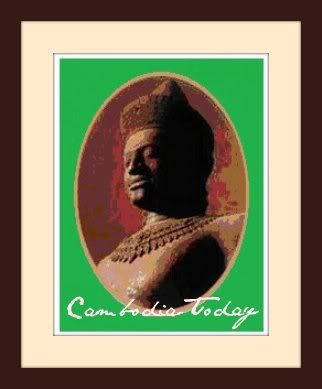This one-on-one interview with a former Khmer Rouge party secretary explores his tenure as director of two prisons specializing in what we now call “enhanced interrogation techniques.”
 |
| Mam Nai (back row, far left) and Duch (back row, second from right) at an unknown location in Phnom Penh. Date is unknown. Courtesy of Documentation Center of Cambodia |
Best viewed as a companion piece to his 2002 documentary, S21: The Khmer Rouge Killing Machine, Cambodian auteur Rithy Panh once again delves into his homeland’s bloody historical record in Duch, Master of the Forges of Hell.
This one-on-one interview with a former Khmer Rouge party secretary
explores his tenure as director of two prisons specializing in what we
now call “enhanced interrogation techniques.” Composed mostly of talking
heads and archive footage, doc’s best bet is fests, public TV and a few
specialty distribs following its Cannes premiere.
More formally conventional than S21– which featured a handful of ex-torturers reenacting their crimes within the abandoned secret prison located in Phnom Pneh – Duch consists of a lengthy conversation with Kaing Guek Eav (nicknamed
“Duch” for unknown reasons), a loyal follower of the Khmer Rouge who
supervised torture procedures in the M13 and S21 facilities, and is
currently a serving a 35-year sentence for crimes against humanity.
Giving Duch free reign to narrate his rise to power within the party,
spout Marxist ideology and recite French poetry at will, Panh provides
what is likely one of the most elaborate discussions with someone
responsible for mass genocide, which in this case saw the depths of
nearly 2 million people between 1975 and 1979. At once didactic and
dismissive, Duch explains that he “had to do the job in the party’s
interest, in my own interest of survival,” but denies having tortured
the victims himself. When confronted with conflicting testimony from
several underlings, he just laughs it off, and then claims that he’s
“doing his best to forget.”
Not unlike Hannah Arendt’s classic study of Eichmann, Duch describes
a highly bureaucratic apparatus of death, where testimonies culled from
tortured prisoners are scrutinized, corrected, and then sent to party
headquarters to be examined by defense minister Son Sen and, occasionally, by Pol Pot himself.
Although a few convict photos are glimpsed briefly at intervals, the
film is most telling when Duch holds up copies of his own handwritten
lists of slaughtered prisoners, revealing how an entire life was reduced
by the Khmer regime into a single stroke of ink.
Mixing the interviews with black and white archive images of Cambodian
labor camps, Panh mostly spares us the grittier footage of mass graves
and human remains, allowing Duch’s own accounts of abuse and execution
to sink in even deeper.







0 comments
Post a Comment